|
|
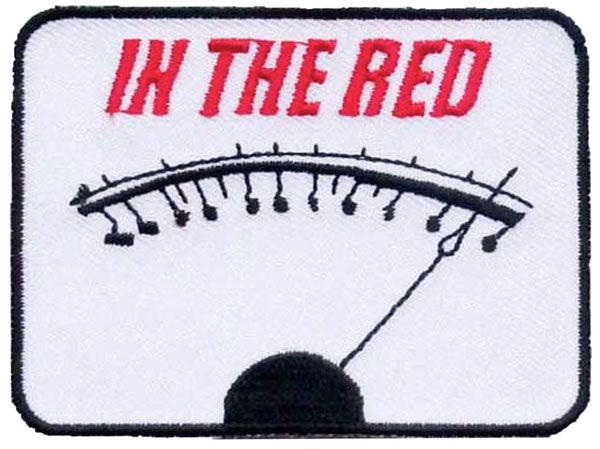
|
As someone privy to Terminal Boredom's existence, I'm willing to bet the farm you know who Larry Hardy is. At the very minimum, his label, In the Red, will ring a bell. Recently, Rob Vertigo completed a very exhaustive and insightful list of his favorite In the Red releases, and Rob's championing of James Arthur � one of my favorite guitarists and songwriters associated with the label � was spot-on. In need of further assistance? Rich's intro to Rob's piece will fill in any gaps.
On a personal note, I met Larry Hardy a little over a decade ago. Countdowns/Flash Express front man Brian Waters introduced me to Larry at a Flash Express show, but it was from interviewing Larry (with Todd Taylor for Razorcake) at his house/label headquarters in Eagle Rock, California, where I really got to know him. Unlike most label owners operating on his level�profitably and with a degree of professionalism�Larry appeared interested in my thoughts on music. He also took me somewhat seriously as a young journalist. The lack of any trace of pretension with Larry genuinely surprised me.
Larry and I kept in touch. He'd send me his latest releases and I'd give him my honest feedback on them�and there were a few, I'd estimate just under ten percent, that we really did disagree on. Nevertheless, I always respected what he released. Of course, you had to pay attention to what In the Red was doing�Larry would hit the ball out of the park harder than Dave Kingman with most of his titles.
In 2011 I started my own label. I can honestly say that without Larry's help (along with Eric Friedl at Goner), Spacecase Records would've never reached release number three. Any time I had a question�and I had many�about distribution, wholesale pricing, pressing plants, etc., Larry was there with advice. It served him no financial benefit; he was motivated by his interest in esoteric music. And if a record had no chance of selling, I was probably interested in it.
I can count less than ten people I've met through music who've been unconditionally supportive of my efforts and made this whole endeavor not seem like a total waste. Larry Hardy is certainly one of them. Unlike a lot of Terminal Boredom's readership, I didn't catch the halcyon days of Crypt Records. I was in elementary school. For someone born in the early '80s, In the Red was my Crypt Records. The label was a real lifesaver, responsible for so many exceptional records, past, present and future.
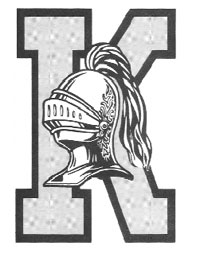
TB: You're from Anaheim, right?
Larry: Yes. I was born and raised there.
TB: What high school did you go to?
Larry: I went to Katella.
TB: My cousins went to Katella.
Larry: That's crazy.
TB: They were Katella Knights too. My family used to go my cousin's football games there back in the mid-'90s.
Larry: Brad Eberhard from Wounded Lion went to Katella too. My mom still lives in the same house I grew up in. I used to go to Anaheim Stadium a lot to see the Angels. My dad would take me to games. But I was never a baseball fan. I'd just stare off into the lights, watching all the moths that would swarm around them. Some of those moths were the size of sparrows.
TB: Wasn't there a punk riot at Katella?
Larry: There was. That happened my senior year, '80-'81. A kid at my school�I can't remember who it was�was able to get Black Flag booked at our school. Black Flag was willing to play pretty much anywhere. I'm not sure if they announced it in an interview or what, but they'd play high schools and colleges. One of the kids at my school who was in the student body�it was suggested to him by some of my punk-rock buddies that he should book Black Flag to play the school. They knew that there was no way the school would allow a punk band to play, let alone a notorious one, so they booked Black Flag under a false name. I can't recall what name they went under, but I remember they were supposed to be a country-and-western band. Somehow word got out the night before that Black Flag was going to play Katella High. It got back to my school and the show was cancelled the day Black Flag was supposed to perform. A bunch of punk rockers turned up on campus to see them. You were not popular at Katella High School if you were into punk rock in '80 and '81. You were pretty much a pariah. So students and administrators were not having it when people who did not go to our school were showing up on campus. There were fights and cops were called. It turned into a big mess.
TB: That's great.
Larry: It was awesome. It would have been better had Black Flag played. If those students who already had a low opinion of punk rock saw Black Flag perform, seeing their reactions would've been priceless. Anaheim was very conservative. It was a red county. Still is.
TB: It's pretty incredible that you saw all those original LA punk bands before you graduated high school.
Larry: From a very early age I was into music. I figured out music was going to be my thing early on. I had a much greater interest in music than most of my peers. I started listening to Rodney Bingenheimer in late '76. I heard the Sex Pistols and the Damned for the first time on the same night. That did it for me. I spent all of my money on punk 45s. As soon as my parents would let me go to shows I did. I had a friend whose older brother would take me to shows. He'd go to Hollywood and he knew the guys at Back Door Man magazine, people like Don Waller. He played the first Pere Ubu single ("30 Seconds Over Tokyo") for me, which he'd picked up through mail order. He'd also take me to the Capitol Records swap meet which happened once a month. I was going there when I was fourteen. After I turned fifteen, my parents let me go to shows. All I had to do was keep my grades up. I started going to shows in Hollywood at the tail end of '77. I picked up all the punk fanzines. I had heard about the Screamers and the Germs before I ever saw them. They were local, so you could actually see them.
|
|
|
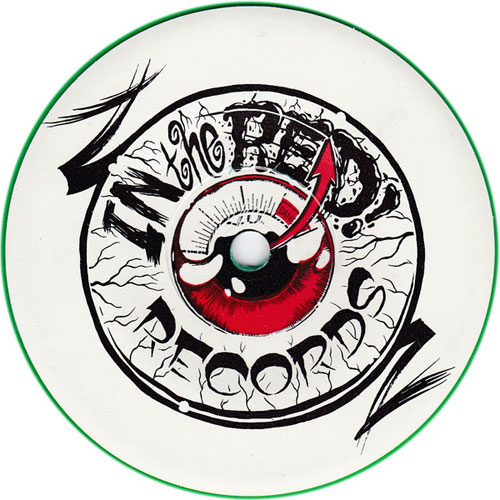
|
TB: What early punk bands did you see?
Larry: The Germs were one of the first bands I saw. That was the Germs show where Jeffrey Lee Pierce's band, the Red Lights, opened. The next night I saw X. I saw F-Word, the Bags, the Eyes, the Simpletones, and the Screamers a couple of times.
TB: Did you ever catch Catholic Discipline?
Larry: Never did. I wish I did. There were a lot of great bands I missed. I never saw Black Randy. I could have gone to see him. In high school, I didn't care much for his record ('Pass the Dust, I Think I'm Bowie', 1980). I listen to it now and wonder why I didn't get into it.
TB: This is going way back, but do you remember anything at all about seeing the Red Lights? They only played three or four shows. Not many people saw them.
Larry: I took photos of them. I recognized him (Jeffrey Lee Pierce) from the Capitol Records swap meet. I also knew he was a writer for Slash, where he wrote under a reggae name (Ranking Jeffrey Lea). Although they did play a reggae song, I was surprised the Red Lights weren't a reggae band.
TB: You went to college after you graduated high school in '81. You were taking art classes, right?
Larry: I did. That was what I had hoped to do for most of my youth. But once I was in college, I realized I wasn't going to do art.
TB: Throughout the '80s, you were mostly collecting records and going to rock 'n' roll shows, huh?
Larry: Totally. That was basically my life.
TB: I worked at Albertson's for three months when I was sixteen. It was dreadful. I know you've had nightmares where you find yourself working at the grocery store again.
Larry: It wasn't fun. It got worse the longer I was there. I hated answering to people. It was also a fairly conservative place to work. The way you looked was a big thing. It was a total bummer. The grocery store offered health insurance and decent wages for a part-time job. I initially started working at Albertson's when I was in college. But after I dropped out, I still worked there for years until I was able to figure a way out.
TB: How did you transition from working at the grocery store to doing In the Red full time? I imagine Long Gone John (Sympathy For The Record Industry) was something of a guide.
Larry: Definitely Long Gone John. I'd watch him put out legitimate records. I knew Tim Warren (Crypt Records) then, but he lived in Europe. Tim had already done 'Back From the Grave'; it seemed like he had a huge head start on everyone. I watched John do the same thing I'd later do. John worked a shit job; he was a music fan who'd go out to shows a lot. He wound up putting out a Lazy Cowgirls album, who at the time were my favorite local band in LA. I remember thinking it was crazy that he got to do an album with them so easily. That impressed me.
|
|
|
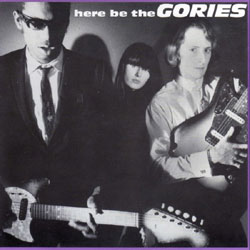
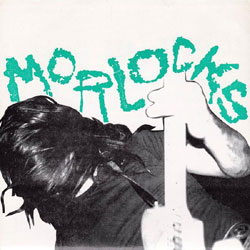
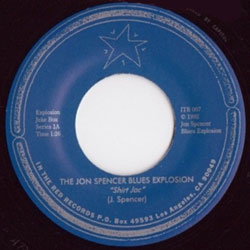
|
TB: As I understand it, the Gories inspired you to do the label, although your first release was a Morlocks single you weren't too happy with.
Larry: Yeah. The Gories were the first band I contacted. I had already been thinking about putting out some records at some point, just to feel like I did something as opposed to being just a fan. I wanted to contribute something. Again, I was friends with Long Gone John, and once he got going he was cranking stuff out weekly. I wanted to release a single by a band that he wasn't already working with which was hard. Then the Gories came along and it was like, "Okay, this is the one." The only reason the Morlocks single came before it was because once the Gories agreed to do the single and I had the money for it, it took a long time to get the recordings out of them. Like a year. I just got antsy.
TB: Had you done any rock writing or anything else before starting In the Red?
Larry: I had contributed to a couple of friends' fanzines, but nothing major. I always thought rock writing was something I'd pursue. I had done pretty well in school with writing. Although I was a music fan, I had no aspirations whatsoever to be in a band or get onstage in front of people. I knew I'd have to do something behind the scenes. I'm glad I chose putting out music as opposed to writing about it.
TB: That's the lowest of the low.
Larry: (laughs) There aren't too many good writers left. I can think back and there was a time where there were numerous magazines that were great, with writers that you really respected and looked up to. There's not a lot of that anymore.
TB: The advertising-supported business model for journalism is in collapse. It was sort of a dubious model to begin with. The PR companies control a lot of what gets covered nowadays.
Larry: That's for sure. You have to be cautious about what sort of press release you send out. Nine-tenths of the reviews you read are going to be that press release sort of vaguely rewritten. It doesn't take much to come up with those types of reviews. It's certainly not rock journalism. Byron Coley never did that.
TB: Jon Spencer really got the ball rolling for you.
Larry: I lucked out when I met him. I was there at the right place at the right time. Jon was playing in the Gibson Bros. They came through town and they were on the short-list of bands I wanted to release records by when I started the label. I was way into the Gories, the Gibson Bros. and the Cheater Slicks. I was a huge Pussy Galore fan, but they had just split up. I didn't know Jon was playing (in the Gibson Bros.) when they came into town. He had just started the Blues Explosion; I had just started the label. Jon liked a lot of the same bands I did. Like I said, I lucked out when he asked me to put out the Blues Explosion single.
TB: The early '90s was a really good time for mail order. Were you able to break even with the label early on?
Larry: I was breaking even. I was lucky to be able to sell the stuff. This was before I had a distribution deal, so I was doing it all myself. You're selling records to different people, moving one-hundred copies here, another one hundred there. Over the course of the first couple of years, I got to work out who paid me and who didn't. It was a bummer when you couldn't get people who owed you to pay you. They'd want your new record, but you couldn't send it to them because they owed you too much money. My mail order then was very minimal. I didn't even have a computer back then. It's not like now where you have Paypal. My mail order is much more involved now.
TB: Jimmy Hole has done a lot of your artwork and ads over the years. But who was helping you at the beginning? Obviously, bands were supplying a lot of the cover art.
Larry: The bands usually came up with the cover art themselves. They'd send it in to me. If any artwork needed to be done on my end, like a logo for the label, I had a friend named O. who would do it.
TB: Wasn't O. in fluf?
Larry: He was in fluf and Olivelawn. O. is a really good photographer. He was around the skateboard scene.
TB: Oh, yeah. Fluf provided the soundtrack to a lot of early and mid-90s skateboard videos.
Larry: Right. O. was an awesome buddy. You couldn't meet a cooler dude. He helped me out a lot. The early labels were done by him. He did my first ads. I had never touched a computer. O. was one of the few friends I had who had a computer and a printer and knew how to use them. O. helped me out a lot before I met Jimmy. I relied on a lot of different people until Jimmy came along. When I met him, he became my guy.
|
|
|
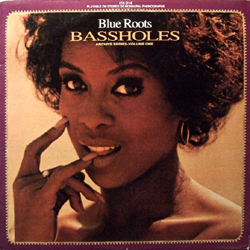
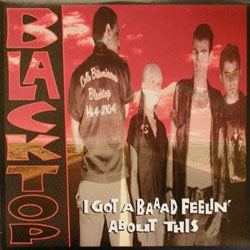
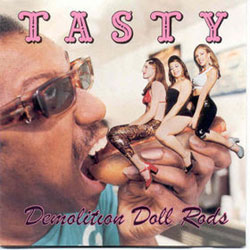
|
TB: What were some of the lessons you learned early on with In the Red?
Larry: The first album I did was a Bassholes ('Blue Roots [Archive Series�Volume One]', 1992) record. I hadn't even planned on doing full lengths. I just wanted to do singles. Don Howland offered me the first Bassholes album. It was so good that I wanted to do it, so I did. I followed that up with the Cheater Slicks' 'Whiskey' (1993). At the time, both those bands didn't tour; the Cheater Slicks did a little later. So I put out those two records and we just saw what they did. I put an ad in Flipside and a couple other places. There was no real stress. I followed those records up with albums by Blacktop ('I Got a Baaad Feelin' About This', 1994) and Demolition Doll Rods ('Tasty', 1997). I went out of my way to do the Doll Rods record. I loved them so much but they were a touring machine. That was a record where, as soon as I put it out, I had to hire a publicist�an expense I had never dealt with before. They had a booking agent, so I had to get posters to all the clubs they were playing. Blacktop was the same way. They did one national tour before they imploded. I was suddenly faced with new challenges I wasn't accustomed to. I had never hired a publicist before to help get press. That stressed me out big time. The booking agent I was dealing with represented both bands, and he was pretty hardcore about his role. He'd tell the Doll Rods and Blacktop, "You need to get on another label. This guy doesn't know what he's doing." I made it through. At this point, I can do that stuff easily. But that was the first time I had ever dealt with it. Long Gone John never dealt with that stuff (at Sympathy), even when bands asked him to. But I also knew that bands would typically do a record with John and then move on. I was hoping to keep bands on my label by doing that sort of stuff. Of course, that doesn't always work out either (laughs). Tim Warren and my friend Bruce (Milne) of Au Go Go Records helped me out a lot. They said, "Rest assured, if things go wrong�records don't sell or no one comes out to a show in New York � it'll be your fault. Every time."
TB: When were you finally able to quit the grocery store?
Larry: Sometime around 1995.
TB: Four years into the label.
Larry: Yeah. At the end of 1995, my friend David Katznelson, who worked at Warner Bros., got his own label. Warner Bros. was going to sponsor it. He was into the Boredoms and Japanese noise�really esoteric stuff. He wanted to do records like that, but he couldn't do it at Reprise.
TB: This is Birdman Records?
Larry: Right. He finagled his contract to allow him to do this label and they'd help him with it. Part of the contract included an employee: me. I moved to Burbank. We got an office in Burbank and it was the headquarters of In the Red and Birdman. Initially, we shared it with Crypt. Tim Warren needed new digs.
TB: So you were able to quit your job, but it wasn't off In the Red?
Larry: No. I was getting paid through Birdman. I was allowed to do In the Red as well.
TB: That's a pretty amazing deal. Birdman was doing records with Tom Recchion. Birdman did great stuff, but I'd be surprised if you could move one-hundred copies of some of their titles.
Larry: That's my favorite Birdman release too. I keep thinking Tom's record needs to come out on vinyl. If no one does it soon, it should be me.
|
|
|

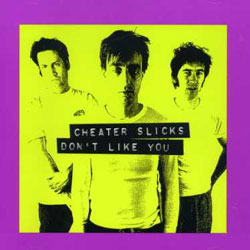
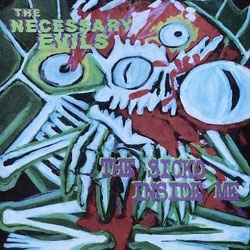
|
TB: Did you meet Kim Salmon through Bruce Milne? That Surrealists record you reissued ('Hit Me with the Surreal Feel', 1996) was an early one for you.
Larry: No. Bruce had done records with The Scientists, but then there was a falling out between them. I'm friends with the guy who books Kim Salmon. He knew I was a massive Scientists fan, so when I got the label going, that record was offered to me. I love that first Surrealists album. I wanted to license it for the US.
TB: A band that meant a lot to you, although they didn't move a lot of records, was the Necessary Evils.
Larry: A personal favorite. I remember James Arthur once joked that the Necessary Evils were In the Reds' Monkees. James had gone on tour with the Cheater Slicks after I released their record 'Don't Like You' in 1995. He jumped in the van with them. The Cheater Slicks told me that James brought along this cassette tape that he kept playing of a band called the Black Panthers. It was the dude (Steve Pallow) from the Beguiled's new band. The Cheater Slicks were raving about it. The Cheater Slicks don't rave about anything. I took that kind of seriously. When I asked James about it, he said, "I don't know if the band's still together; it sounds like they fell apart." At the time, James was living in Texas but he wanted to get out. James said, "Well, I've been talking with Steve about firing the band back up and I'll join it. I'm thinking of moving out to California." I told him, "Move out. Get it going." James crashed on my couch when I was living in Burbank. I got to know Steve. We became good friends. He actually lived behind me in Burbank at one point. It was like the Necessary Evils' headquarters was right behind my house. When I became friends with Jimmy Hole�the Necessary Evils talked about getting a bass player, so I introduced them to him. Jimmy got in the group. It became a band of my buddies. I facilitated getting them into a recording studio and doing the records. I definitely got to watch that band develop from the ground up.
TB: Was Jimmy doing all the artwork for you by that time?
Larry: He was. In fact, that's how he met the guys in the Necessary Evils. I need promo photos for their first album and Jimmy's a photographer. Jimmy came over to my house in Burbank and snapped their pictures. He joined the band a short time later.
TB: In 2000 you released 'Panther Phobia' and 'The Black Godfather'. They're two great albums� 'Panther Phobia' is the second best Panther Burns record�but they probably weren't easy albums to get completed. How did you survive that period?
Larry: I survived it okay. 'Black Godfather' did really well. The first Andre Williams album I did, 'Silky' (1998), that was one where I kind of overextended myself. I had to shell out an advance. I think it was only three-thousand bucks, but that was a lot for me at the time. So many people assured me that doing a record with Andre Williams was a bad idea: "God knows what a record by Andre is going to sound like now. God knows what he'll be like in the studio." There wasn't a lot of faith in Andre. The Doll Rods introduced me to him. 'Silky was the first record I released that was sort of a surprise hit. It did really well. When we followed it up with 'Black Godfather' �it wasn't as good as the first record, but just the momentum off 'Silky' helped carry it. We had Jon Spencer Blues Explosion and the Compulsive Gamblers on it. There were some notable garage rockers on there. 'Black Godfather' sold well right out of the gate.
People had told me that the Panther Burns do not sell records. The Europeans might buy their records, but a new album would not do well in America. I just knew the record had to be good. I dragged Tav kicking and screaming to work with the band and Jeff Evans. Tav did not want to do that. I went out to Memphis to make sure that it happened. I paid Tav in cash. I know he pocketed most of it. He went and got free used recording tape from Shangri-La Records after telling me he needed extra cash for new recording tape; that he only recorded on new tape. Tav paid Jeffrey Evans a tiny fraction of what he should have considering how long they took to record. I don't know if he paid the band members anything. He then quickly turned on the album right after it came out, trashing it.
|
|
|
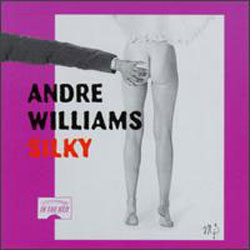

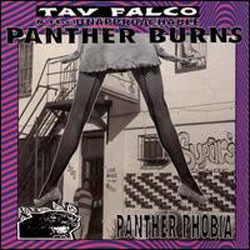
|
TB: I know you consider the Hunches one of the best bands that you ever signed.
Larry: Definitely. They're one of the best bands I ever got to work with.
TB: When did you first come across them?
Larry: I was really lucky that I went out on a West Coast tour with the Cheater Slicks and Necessary Evils. I did the driving. When we got to Eugene, Oregon, which was a weird town to be playing; it was remote and there wasn't much of a following there for the kind of music the Cheater Slicks and Necessary Evils were playing. There was this band called the Conmen who opened. They were really young�fifteen or sixteen years old. Their parents drove them to the show. When they got on stage, they blew us away. The Cheater Slicks were really impressed. It prompted The Cheater Slicks and the Necessary Evils to play really well that night because they didn't want to be blown off the stage by a bunch of teenagers. Chris Gunn was on guitar and Hart (Gledhill) from the Hunches was the singer. I loved their set so much I bought them a pitcher of beer which, looking back on it, wasn't such a smart thing to do. Chris wrote me a letter after that, thanking me and saying what a good night it was. I went to Portland, Oregon, again a couple of years later�the Horrors were playing�and Chris and Hart were there. They had gotten older and taller. They told me they had a new band going called the Hunches. I always had it in the back of my mind that I could work with them. They were cool and they knew music. They were really young and had it figured out. Total naturals. The Hunches sent me their first demo. I thought it was good, but a little too pedestrian. I knew what they were capable of. I had them come down to the Distillery to record. I wound up doing three albums with them. I still have that letter from Chris.
TB: 'Blood Visions' (2006) really took off. You sent me an early copy of the record, and while it was clearly good, I was surprised by the overwhelmingly positive reception it got.
Larry: It surprised everyone. We all knew it was a good record. Jay didn't want to be a solo artist and he initially had no plans to tour behind the album. He didn't want a publicist for the record. He didn't want to promote it or spend a lot of money on it. Instead he would record an Angry Angles record afterwards, and then tour and promote both albums at the same time. But then the Angry Angles broke up and all of a sudden there was this buzz on 'Blood Visions'. It was going down well with everyone. Months after the record was released, he finally started playing solo shows behind it. It was a really slow build up. Having Jay's album, the Ponys and the Black Lips all going on within the same year and a half or so was a real turning point for the label.
TB: 'Ode to Joy' (2003) came out a little bit earlier. Although the Deadly Snakes couldn't get arrested, that was a great album.
Larry: It's sad because they should have been much bigger than they were. I went to see their farewell show in Canada. I was told by people that they were popular in Canada; the crowd for their last show was massive. But they never took off in the US like they should have. I never understood why.
TB: I remember seeing them at the Silver Lake Lounge around the time of 'Ode to Joy'. I was a kid. Twenty-one or so. There were maybe a dozen people there.
Larry: I remember that show. No one knew who they were. They had bad luck. They'd tour the US right before an album would come out. I remember they played the Echo in Los Angeles the day after a big garage-rock festival. No one came out to see them.
|
|
|
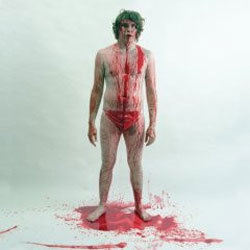
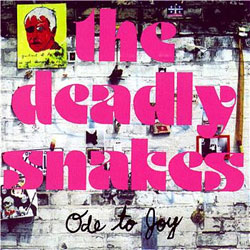

|
TB: 'Hello Young Lovers' (2006) by Sparks was a highlight for both you and the label.
Larry: Yeah, yeah. That was a crowning achievement. I still can't believe I got to release a Sparks record. I got an e-mail from Russell Mael about it. I was a massive Sparks fan. My friend Steve McDonald from Redd Kross had started playing bass with them. Steve called me up and said, "Hey, I played bass on Sparks' new album and I'm supposed to go over to their house to listen to it. Do you want to come with me?" I said, "Absolutely. I'd love to meet the Mael brothers and listen to the album." Every time we planned to go over to listen to it, something would happen: either Steve couldn't make it or Russell wasn't around. It got delayed for a month. In the interim, completely unknown and unrelated to Steve, someone told Russell that he might want to contact me about releasing the record; that I was a massive Sparks fan and would likely be interested in it. Sparks was having trouble finding a label for the record in the US. That's when I got that e-mail from Russell out of the blue. I told him, "Yeah, I'm interested. Coincidentally, I'm supposed to go over to your house soon and listen to it." The next week, Steve and I went over there to hear it.
TB: You're looking at doing more reissues now, huh? You've already done some great ones� The Consumers ('All My Friends are Dead'), The Urinals ('Negative Capability') and you've got a Homosexuals record coming out. The label's just celebrated twenty-five years in business.
Larry: We're reissuing the Simply Saucer record.
TB: 'Cyborgs Revisited'. I forgot about that.
Larry: Yeah. We're doing an expanded version of that album. We're doing a 100 Flowers reissue as well. There's a lot of punk and post-punk stuff I've got my eye on. Even some of my old catalog, I want to get some of that stuff back in print. I need to get those early Cheater Slicks records back in print. I get asked about those records a bunch. I like doing reissues. They're easier. There's no touring involved. I don't have to hire a publicist for it usually.
TB: After twenty-five years in business, some of those early releases are becoming archival reissues.
Larry: We've been going on so long, now I get labels approaching me about reissuing some of my old titles. They want to license albums. I think, "Ah, I can't think of that record not being on my label anymore. But I guess it has been out of print for a long time. At least on vinyl." Vinyl's the only format people really care about anymore.
TB: Right. In the mid-'90s, labels were doing token runs of vinyl.
Larry: Exactly. There were even some releases in the '90s that didn't get a vinyl release. CDs were the popular format. On releases that I didn't think would sell very much, I didn't do vinyl. It was really expensive. There were a few albums from that time period on In the Red that were CD-only releases. I need to get those out on vinyl.
TB: And 'Panther Phobia'!
Larry: People ask me about that. I 'm not sure how Tav would respond to that.
TB: After twenty-five years in business, is keeping In the Red going getting any easier?
Larry: I find it easier. Financially, it's easier because I've got a system worked out now. As long as I keep that chugging along, it's good. There are peaks and valleys, of course, but for the most part I've got it under control. Different problems arise. Nowadays, that's mostly from vinyl manufacturing. It's just hard to judge when a record will really be done.
|
|
|

|
END INTERVIEW
In the Red Records on the web.
In the Red on the ol' facebook.
The first Termbo interview with Larry here.
The second Termbo interview with Larry here.
Spacecase Records is here, watch for Ryan's collection of interviews Bored Out coming soon.
Photos courtesy of the internet.
Interview by Ryan Leach, 2016.
To read other TB interviews, go here.
|
PREVIOUS PAGE � HOME � NEXT PAGE
|




















